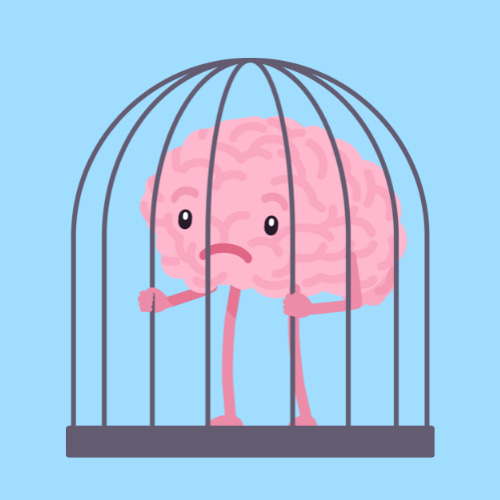Hi ADHDers!
Has anyone else tried Cognitive Behavior Therapy?
I started CBT recently and it was… interesting!
Shall we begin?
I’ll be touching on:
Why I opted for CBT
Pros and Cons of CBT
Things to consider before CBT
Why Cognitive Behavior Therapy (CBT)?
“Cognitive behavioural therapy (CBT) is a talking therapy that can help you manage your problems by changing the way you think and behave. It's most commonly used to treat anxiety and depression…” - UK NHS
It had been just over 2 months into being unemployed. I quit my job, without having anything lined up. *Gulp*
I received a broadcast text message from my GP practice that CBT sessions were being rolled out across my borough for people that might need it. 6 sessions for free!
I signed up with a quickness!
I took a few questionnaires and got paired up with a nice and experienced therapist.
I scored moderately on anxiety, and depression and the results showed that I have an avoidant attachment style.
It made sense.
I was stuck in a rut.
Pros and Cons of CBT
Let’s start things on a positive note, the Pros.
Pros
Getting a grip on my tendency to worry
Raise a hand if you worry a lot. Like the type of worry that continues to snowball and snowball into the size of a planet.
Great, it’s not just me.
“If you’re forgetful, find different things to help you remember instead of relying on anxiety to alert you.” - My therapist
My therapist gave me an exercise to categorise my worries into a column of practical worries and hypothetical worries.
Practical worries - Worries regarding things that are affecting you now - where there is a practical solution.
Examples: I haven’t submitted a job application
Hypothetical worries - Worries regarding things in the future - where there may be no practical solution.
Example: What if the economy tanks and it affects my business?
Sound familiar?
What I found useful: I realised that most of my worries were hypothetical and I needed to chill out. Also, there was a way forward to solve some of my practical worries.
So in the end, I was able to worry about fewer things and was able to take some steps to solve my practical worries.
CONS
The structure is quite rigid
CBT can feel like you’re following a course curriculum that comes with homework. The structure is set and felt like ‘so what are you going to do about it’ instead of ‘let’s think about why something is affecting you’.
The workbook, exercises and frameworks aren’t suited/tailored to people that need to work through trauma, bad experiences, grief, and uncertain feelings - in my opinion.
Exercises like keeping a worry diary and scheduling time to worry weren’t for me. It felt like 2 more things I needed to add to my to-do list.
Like a tick-box exercise.
The problem-solving solutions in the workbook were quite generic and didn’t include many prompts or suggestions. It’s very self-led although my therapist was always open to providing suggestions.
ADHD & CBT
So I wouldn’t say CBT is bad, because it seems to work wonders for some people.
Before deciding to go with CBT, it’s worth considering:
What do you want to work through? If it’s trauma-related, I’m not sure that CBT will be the most effective.
If you’re ready to complete practical exercises outside of the session. I found that you really need to throw yourself at completing the exercises as most of my sessions were focused on those.
The therapist may not have experience with ADHD. This matters when it comes to completing exercises and submitting things. You may need to give them a heads-up.
Ask questions and don’t be afraid to raise issues you’re facing outside of the set ‘exercises’.
Ask your therapist to adapt/tailor methods for your ADHD brain. My therapist was kind enough to do so and sent me a procrastination booklet.
If you don’t have access to or funds for therapy, many workplaces offer an Employee Assistance Programme (UK), you could apply for an ADHD coach via the Access to Work scheme (UK), or you could ask a therapist if they offer reduced rates/pro bono.
If you’ve done CBT, feel free to share your experience in the comments!
Don’t forget you check out my YouTube channel. New video on Rejection Sensitive Dysphoria will be uploaded soon: www.youtube.com/@AdultingADHD
That’s all from me,
Rach with ADHD!






I tried CBT few years ago for my anxiety, (before I even knew about my ADHD) but it did not even work for me. Maybe it was the person I talked to.
I'm open to try it again. Hopefully I might get the right one.
Hi, I tend to agree with you regarding CBT versus trauma and PTSD. CBT is born out of studies to show effective treatments for the things they target. It’s not a one size fits all. And trauma and grief are not things that can be over come with a worksheet and some mental tricks. Unfortunately some recoveries are a function of time and compassion. It can be highly effective for certain things and people that engage with the process. But ADHD can make that harder to keep consistent. I found a low-effort easy to get into talk therapy quite useful and more targeted to me. That being said it can depend a lot, I spent many years finding a therapist that suited my experiences. One thing my therapist is not, is an ADHD specialist, so I may need to find someone for just that. It’s not wrong to seek a multi-pronged approach to solving your own mental challenges.
Love
D